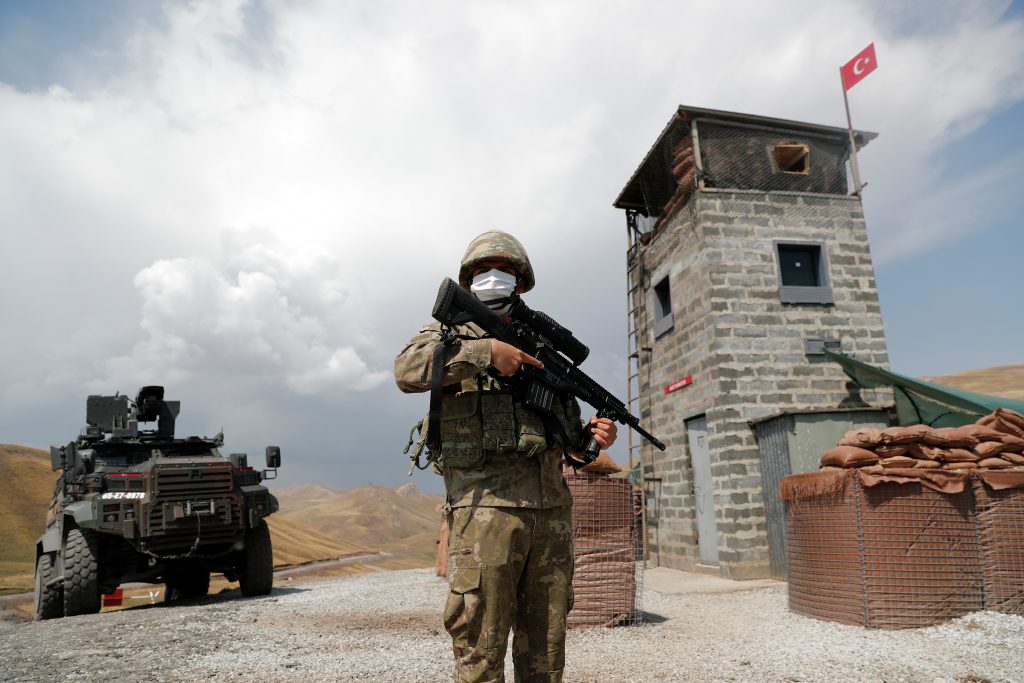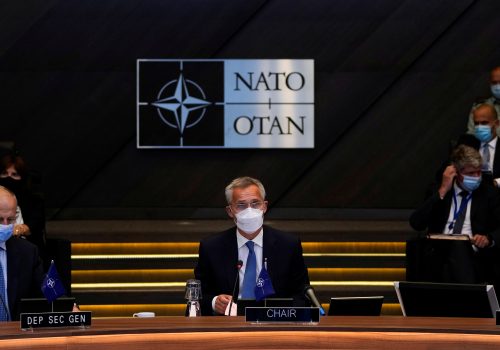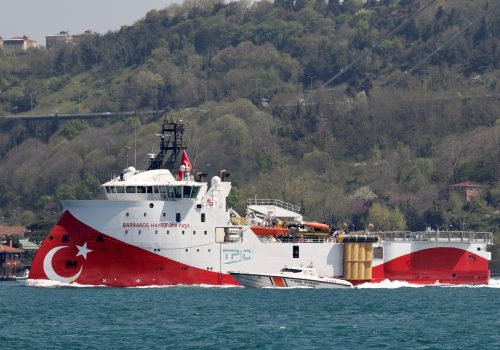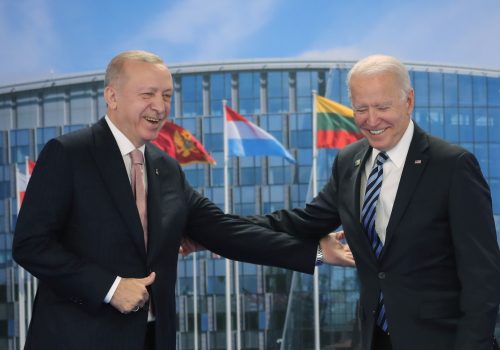The Taliban’s takeover of Afghanistan has changed the regional landscape. For Turkey, a NATO member which has made significant contributions to the mission in Afghanistan, the picture is multi-dimensional, encompassing strategic, security, and migration issues.
Below, the Atlantic Council IN TURKEY asked experts for their take on the myriad of challenges facing Turkey as a result of the Taliban’s takeover of Afghanistan.
Alper Coşkun: Turkey’s window of opportunity to keep the Taliban accountable
Can Kasapoğlu: Why rising terrorist threats are bad news for Turkey
Başak Yavcan: The EU and Turkey will need to work harder to collaborate on migration
Turkey’s window of opportunity to keep the Taliban accountable
Looking into the future, I think it’s important for Turkey, as a responsible member of the international community and as a NATO ally that has made very significant contributions to the efforts in Afghanistan, to act together with its allies and partners. It seems that the international community, particularly the West, will try to hold the Taliban accountable. And the carrot that is being presented to the Taliban is in the form of potential recognition and also economic aid.
But I see a weakness there which I am sure the Taliban has also noticed. Until recently, the argument, made particularly by the United States and Western allies about the Taliban before it overran the country, was that any taking over of the country by force would result in non-recognition. Now that goalpost seems to have moved. The international community is giving the subtle message that the Taliban may be recognized if it abides by the international standards that the West and the international community expect. That in itself, in my opinion, is a sign of weakness, and it shows the challenge that the international community is up against in its dealings with the Taliban.
Turkey has a long history of affinity with Afghanistan. That has been the basis of its significant undertaking in the country for years. Its Muslim identity is also a positive. Turkey has made the point throughout its engagement in Afghanistan not to actively engage in combat operations. The Taliban seems to be taking a comparatively positive approach towards Turkey. This may enable Turkey to find a window of opportunity to contribute to international efforts that’ll help encourage the Taliban to stand up to international standards and be responsible in its behavior.
—Alper Coşkun is a former ambassador and director general for international security affairs at Turkey’s Ministry of Foreign Affairs
Why rising terrorist threats are bad news for Turkey
We have two major problems emanating from the Taliban takeover. First, the organic ties between this radical “Afghan horde” and de-territorial Salafi-jihadism—pioneered by al-Qaeda—have never ceased to exist. In fact, these dangerous ties are truly symbiotic in nature.
Over two decades, amidst the overwhelming pressure imposed by the US war on terror, al-Qaeda leadership has shifted its political-military focus and resource allocation from running global operations to supporting regional affiliates. With Taliban rule, now is the time for the new generation of al-Qaeda leadership to bear the fruits in Afghanistan. Unfortunately, Western efforts to encourage a divorce between the Taliban and al-Qaeda remain highly unrealistic, if not fully naïve.
The second problem is that the Taliban takeover can lead the way into a Salafi-jihadist spillover into Central Asia. This would mean bad news for Turkey. The ISIS-K branch, which even had problematic relations with the Taliban so far, deserves utmost attention in this respect.
One should not overlook the fact that, to date, the perpetrators of the most startling ISIS terrorist attacks in Turkey—the Atatürk Airport attack back in June 2016 and the 2017 Istanbul nightclub massacre on New Year’s Eve—hailed from Central Asia and the Caucasus. Open-source intelligence works suggest that ISIS-K, the dominant “franchise” of the terrorist network in Afghanistan, has been very active in the Central Asian digital information environment, harvesting militia from the indigenous youth populace of the Turkic region. With the August 26 terror plot in Kabul, the threat is way more imminent and dangerous than ever.
Overall, geopolitically, the “Taliban effect” is not limited to Afghanistan. Salafi-jihadism is an ecosystem in which various actors, with different and distinctive features, operate. The Taliban takeover bears the potential to introduce a reloaded abiogenesis to the Salafi-jihadist terrorism ecosystem. This is bad news for Turkey, for Central Asia, for the West, and for the world.
—Can Kasapoğlu is the director of defense research at the Istanbul-based think-tank EDAM (The Centre for Economics and Foreign Policy Studies) and a fellow on Euroasian military affairs at Jamestown Foundation
The EU and Turkey will need to work harder to collaborate on migration
Both as a country of destination and transit, Turkey has been at the crossroads of various large migration waves in the last century. The country hosts the largest number of refugees in the world at the moment, including 3.6 million Syrian refugees. The country is also at the heart of the irregular migration routes mostly connecting to Europe. Until the Taliban took over Kabul, those irregularly entering the country, when caught, could be deported to Afghanistan thanks to a cooperation arrangement between the two countries. This also kept the number of irregular Afghan migrants and illegal crossings to Europe low.
However, this arrangement is neither operationally nor ethically feasible anymore. Viral videos of large groups of migrants arriving in Turkey preceding the Taliban takeover have created a major outburst among the public with cries for stricter border security. Coupled with the COVID-19 pandemic and economic tightening, this event lit up anti-refugee sentiments among the host community. These negative attitudes were already exacerbated by poor public diplomacy to make the public aware of the rights of Syrians or of the funds allocated by the EU—as political discourse usually blames the EU for not keeping its commitments about funding for supporting refugees and Syrian refugees for integrating poorly into the formal labor market. In addition to this discourse, recent attacks by political figures in the opposition have contributed to the spread of disinformation in the hopes of electoral gains.
Unfortunately, all this leads to higher tensions between the public and refugees and sometimes even deadly conflicts as demonstrated in clashes in the Altındağ district of Ankara recently. When the future of EU-Turkey cooperation on migration is considered, it is clear that the relatively welcoming attitude of the Turkish public in the past should no longer be assumed, and EU-Turkey cooperation should help support refugees attain formal employment and social cohesion. Considering the existence of several other refugee groups, EU Emergency Social Safety Net funds should also cover their needs. This cooperation should be far-sighted and not solely focused on further externalization of the EU migration policy and stricter border security. It should also consider sustainable solutions which would support both the refugee and host communities in Turkey. This time, these channels of cooperation should be made clear, disseminated among the public. Last but not least, other countries should actively participate in burden-sharing by both supporting integration in the countries of first asylum and establishing higher resettlement quotas.
—Başak Yavcan is an associate professor and vice chair of the Center for Social Policy Research at the Department of Political Science and International Relations of the TOBB University of Economics and Technology and also a senior researcher at the HUGO Observatory of Environment, Migration and Politics at the University of Liège
The views expressed in TURKEYSource are solely those of the authors and do not necessarily reflect the views of the Atlantic Council, its staff, or its supporters.
Further reading
Image: A Turkish soldier stands guard at a military post in Caldiran on the Turkish-Iranian border in Van province, Turkey on August 21, 2021. Photo via REUTERS/Murad Sezer.



